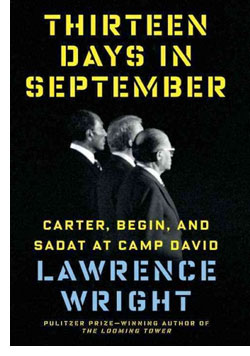 |
 Lawrence Wright
Lawrence Wright
Thirteen Days in September: Carter, Begin, and Sadat at Camp David
Alfred A. Knopf / Random House
US Hardcover First Edition
ISBN 978-0-385-35203-1
Publication Date: 09-16-2014
350 Pages; $28.95
Date Reviewed: 10-01-2014
Reviewed by: Rick Kleffel © 2014
Index:
Non-Fiction
Lawrence Wright does something rather amazing in his latest work of non-fiction, 'Thirteen Days in September: Carter, Begin, and Sadat at Camp David.' We all know how the talks ended; this has been the most enduring peace treaty in the Middle East.
But as we read Wright's tense re-telling of what happened, hour by hour, day by day, he manages to make us suspend our belief that we know what happened because we are so immersed in the story, as told from the perceptions of those who had no idea how it would all turn out.
The origin of the book might give a clue as to why it is so immersive. In the afterword, Wright tells his readers that he was originally approached to write a play, and he did. But in crafting the play, he found so much rich material, he found so much rich material, he knew he had to write a book, and the result is an amazing, informative, tense historical thriller.
What we take for granted now — peace between Israel and Egypt — seemed outlandish in 1978, and none of the men who accomplished it seemed adequate for the task. But Wright's story is bigger than the talks themselves; he weaves in the careers of each of the men and the longer story of the Middle Easter conflict, from Biblical times to the present. If this sounds like a big project, in other hands that might be the case. But Wright proves to expertly economical. He keeps you on the edge of your seat in part by bringing in the back-story only when it informs what is happening in the talks.
Driving the book are the three men at the center; Carter, Begin and Sadat. We're used to a smiling Jimmy Carter these days, but that's not the man we see in this book. He's alternately optimistic, furious, micro-managing and desperate. He'd expected that Sadat and Begin would meet, get to know and like one another and then intelligently discuss and discover a way to peace. That was his wildest bit of optimism. Begin and Sadat hated one another, and they were soon either shouting or making plans to leave.
Begin is revealed as a man with the gift to move audiences with his rhetoric — to move a nation. But Begin himself was not so willing to move and his intransigence threatened the talks from the beginning. He had nothing to lose if they failed. And while he was a man who spoke with great passion to the masses, as a negotiator, his inclination was to nitpick his counterparts into submission.
Sadat had already made the grand gesture before the talks, coming to Israel and speaking to the Knesset. He presumed that begin would be willing to make concessions and offered a plan that Begin couldn't possibly agree to.
Both men were accompanied by fascinating group of negotiators, from the Israeli war hero Moshe Day to Boutros Boutros Ghali, then Egypt's Minister of State for Foreign Affairs. Though he is dealing with a huge cast of complicated characters, Wright makes every one shine and stand out. His ability to craft these men in a manner that readers can easily and enjoyably track is a key point of the book.
Wright's handle on the history behind this history is concise and encyclopedic. Whether he's talking about Biblical history or the creation of Israel after World War II, he knows how to keep everything in focus, in proportion and on point to contribute to the narrative at hand. 'Thirteen Days' is a great pocket history of the Middle East conflict that is as pertinent to this moment as it is to the 1978 peace talks.
And for all that this is a serious book about serious history, Wright has a knack for finding and evoking the peculiar political humor of these situations. You'll meet Sadat's astrologer and see Moshe Dayan in a beatnik wig. Carter's outbursts of frustration, Barbara Walter's bathroom stunt and more offer a well-rounded picture of modern diplomacy at its awkward, absurd best.
The main draw of 'Thirteen Days' is not just that it offers a gripping portrait of a vitally important event. Peace treaties, as Wright observes, are not common, and this one was created by men who at the time seemed uniquely unsuited to do so. But as you read 'Thirteen Days', your mind will be caught in the present. Every word, every sentence has meanings and implication for what is transpiring at this moment, across the entire Middle East. Suspend what you believe to be possible. This tense and gripping story about then, we come to realize, might quite easily become a gripping story about now.
|
 |




